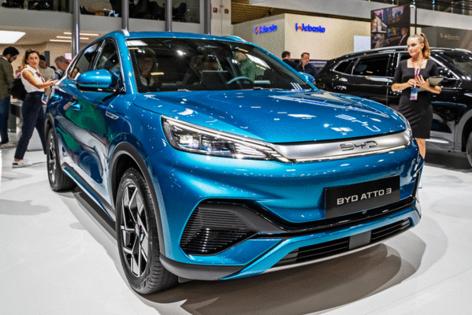China files WTO complaint over the EU's electric car tariffs
Published in Business News
China has lodged a complaint with the World Trade Organization over the European Union’s final tariffs on Chinese electric vehicle imports, escalating a dispute that’s straining an already fraught relationship.
Beijing brought the case to the WTO’s dispute settlement mechanism on Monday to “safeguard the development interests” of the EV industry, according to a statement from the Ministry of Commerce. The ministry reiterated its strong opposition to the EU’s tariffs, criticizing the levies as “trade protectionism.”
China’s formal complaint raises the risk of greater tit-for-tat confrontation in a relationship valued at €739 billion ($806 billion) in bilateral merchandise trade in 2023. The bloc has defended the tariffs, saying it’s a byproduct of an investigation of Chinese government subsidies that unfairly benefit the sector.
“China believes the EU’s final ruling on anti-subsidy measures lacks factual and legal foundation, violates the WTO rules and is an abuse of trade remedy measures,” a ministry spokesperson said in the statement. “We urge the EU to face its mistakes and immediately correct its illegal practices, and to jointly maintain the stability of the global electric vehicle supply chain and China-EU economic and trade cooperation.”
After months of negotiations, threats of retaliation and auto-industry lobbying, the EU last week published the regulation introducing the tariffs of up to 45% on Chinese EV imports — which have been in effect provisionally since July — in its official journal.
The EU and its No. 2 goods-trading partner have had discussions aimed at seeking alternative solutions even after the tariffs take effect, but those talks have so far failed to yield a breakthrough.
The bloc has decided to send officials to Beijing to hold more talks, Bloomberg reported last week. The two sides have been exploring whether an agreement can be reached on so-called price undertakings — a complex mechanism to control prices and volumes of exports, used to avoid tariffs. Both Brussels and Beijing have indicated that the differences remain significant.
The EU’s incoming trade chief, Maros Sefcovic, confirmed on Monday during his confirmation hearing that a team of officials are in China trying to find a negotiated solution to the tariffs.
“We are not interested in trade wars,” he said, adding that there’s a need to re-balance the bilateral relation with Beijing in areas where Europe feels relations aren’t fair.
The European Commission, the bloc’s executive arm, has said it wants to address several issues with China, including overcapacity in critical sectors and the access of European firms to its procurement market.
(With assistance from Jorge Valero.)
©2024 Bloomberg L.P. Visit bloomberg.com. Distributed by Tribune Content Agency, LLC.












Comments